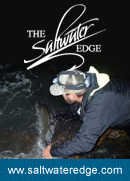Natural Gas Wells and Our Waterways
Jason Gribschaw
Natural gas wells have popped up all over the country, along with the promise to end our dependence on foreign oil. Well, they have yet to put a dent in that dependency, and they are destroying our land, tainting our water systems and damaging our health.
Environmental damage has been a big concern for PA residents and probably for others around the country. I was first told about the drilling by a friend who has property up in the mountains. They have used the property to hunt, fish and rent for many years. Each year they have their well water tested, and the results have always come back flawless. The water was so pure that the people testing it would state that it was some of the cleanest water they have ever tested. That analysis remained the same, year after year, for as long as the family has owned the property. Drilling companies repeatedly offered up big money to drill on the property and everyone in the area had refused. Then, one year a property was sold and the new owner accepted the gas company’s “pay day”.
I cannot remember what year, but it was within the past 5 years or so that the test results have changed. A phone call from a renter brought the fist bad news in the camp’s history. The well water was brown and had a horrible stench. So my buddy had the water tested. This time the test results were not so favorable. The water was so bad that it was reported as toxic. And when I say toxic, they were talking radioactive toxic.
This is one of many stories, but the issue is a big deal. The drilling process uses fresh water mixed with salt and other chemicals to break up the earth’s rock and release the gas. But drilling companies are unable to control the natural toxins that also come up with the gas.
These natural radioactive toxins, that were once trapped miles beneath the earth, are now pulled up and mixed with the company’s waste water. Some states require the waste water to be put into deep underground wells that will not leach, but PA does not have such regulations. There are giant pits of toxic sludge, and the water that does not get dumped into the pits goes to a water treatment facility. The same water treatment facilities put that water back into the rivers which we drink from.
You would assume that the water treatment plants accepting the waste water are able to remove toxins prior to reintroducing that water into the river systems, but they are not. Many, if not most of the water treatment plants, are not able to filter out radioactive materials and the water that they “process” gets put back into the river with radioactive properties. This same water becomes our drinking water. Yes, our drinking water. The rivers that have been polluted provide drinking water for Pittsburgh, Harrisburg, Baltimore, Philadelphia, and New York City, as well as the surrounding areas. The gas company personnel delivering the water often are dressed in biohazard suits, but the companies accepting them are as unprepared as the public that ends up drinking the water.
So what does all this have to do with our fish???? This is the same water where our fish must spawn, hatch and survive, even if it’s only for a brief period of time. Not only are our migrating fish exposed to these events, but everything that they depend on to feed is exposed to the toxins as well.
I don’t want to put the blame on any individual company or agency, but the gas companies as well as our government know what they are doing and are willing to cause long term damage. The gas companies lobbied, and the Fed gave in with the Energy Bill of 2005, when they allowed exemptions to the Clean Air Act, Safe Drinking Water Act, and many others. The government agencies are undermanned and the private sewage treatment plants are not equipped or required to test what they are taking in and putting back into the water systems.
In short, the entire operation needs to be halted, or at the very least held in check until adequate regulations and facility upgrades can properly handle the radioactive toxins that the gas companies are putting into our environment and our diets.
Is it as bad as I have stated in this article? Yes and No…I did some digging and came up with some ugly truths. While this article is written to shock, the gas companies will counter with evidence that the toxic material they bring up is treated by waste management facilities and our drinking water is once again pure. Some of that is true, but not if you have well water, not if your waste management or water purification facilities are not equipped to handle toxic material, and especially not if these facilities are not even required to test for such materials.
Just like the countless number and variety of prescription drugs that are flushed down the toilet every year and now show up in our daily drinking water, the toxins that are being drilled up will eventually become part of you and me. Is the needless poisoning of our waterways, our drinking water and our bodies something we are quietly going to allow or something that we will not ignore?
In any case, this is another factor that I have yet to hear about or read about when people are complaining about the depletion of our fisheries.
[issuu layout=http%3A%2F%2Fskin.issuu.com%2Fv%2Flight%2Flayout.xml showflipbtn=true documentid=110308003917-21741ced73f243ec859cfedc908ef1cf docname=issue6 username=SURFCASTERS_JOURNAL loadinginfotext=issue%206 width=420 height=162 unit=px]












Very interesting. Now the question is will there be a polotician willing to sponsor a bill with some common sense written into it.
↓The waste water and use of fracking fluids in the Susquehanna River Valley is a major concern for many Pennsylvania residents. The Susquehanna water shed of course feeds in to the Chesapeake Bay, which is already suffering from decades of polluted run off and waste water.
Hydraulic fracturing uses millions of gallons of water, sand and chemicals to break apart shale and release natural gas. The wastewater that returns to the surface is a toxic, sometimes radioactive, sludge containing sulfates, benzene, chloride, toluene and other chemicals used in the fracking process.
Some folks benefit monetarily from the deals cut with the gas and oil companies… some don’t… either way you have to ask yourself if this is worth risking the loss of clean water for future generations?
↓If you haven’t seen the movie “Gasland” check it out! Fracture drilling has to be stopped!
↓appreciate the article it’s sad that we are not all aware of what goes on in our own backyard as well as we should be, the impact it has on so much of lives (including fishing) is scary
↓Hey guys,watch out what you wish for cause you just might get it!!!
↓It has to be stopped but unless we put a lot of pressure on elected officals and politicians it will not happen. These gas companies paid plenty of money to most if not all election campaingns to get what they wanted. Profits over health and environmental laws. Thats how these laws got relaxed in 2005 thanks to Bush. The CEO’s and other officers don’t care because they live far away from the areas they destroy and if someone trys to do the same where they live, they have the money and power to stop it because they after all have elected people in their pocket. Maybe they should be forced to live in the areas that they are drilling in to drink the water and live in the same filth they create. My opinion is that no political campaign and elected offical be allowed to take money from any public corporation or company. This way no favors have to be paid back.
↓People might think that gas and oil is the cure for energy and the economy but they neglect to know that oil and gas is small piece of our economy. What is gonna happen if we run out of gas oil….Other sources of energy will come like solar of wind etc. OH WHAT HAPPENS WHEN WE RUN OUT OF FRESH WATER OH YEA WE DIE?????
↓Spending the night in Williamsport on the way back from NCAA championships all you could see in the parking lot of the hotel were a hundred 3/4 and 1 ton pickups all belonging to workers in the hydraulic fracturing industry. Again short-sighted, short-term, so-called solutions to our energy crisis. I’m old enuff to remember how Jimmy Carter was derided over his call for an American Energy policy… Hmmm
↓I’m an advocate of safe environmentally responsible resource management because my children need to live on this planet longer than I do. So don’t take the wrong way. This is post has no technical merit and is very unbalanced. I am surprised to find it on one of my favorite fishing blogs. A quick search shows that fracture fluid is 94.62% water, 5.24% sand, and 0.14% minor components. Minor components are acid, oil, and alcohols that are all non-toxic and used at higher levels in household cleaners. Factor in the fact that shale wells are fracted approximately 1 mile bellow the water table in PA, NY, and WV and it is clear that surface water wells are not impacted from below. The radio active material that comes up through a gas well is typically radon which is released into the atmosphere once pressure is released in a holding tank. Again this does not impact water supplies. I agree that there are also better options for cheep energy like oceanic wind farms and hydrological floats. Everyone wants affordable energy and it is what allows American’s to live the lives we do.
↓I did a quick search and it confirmed what was in the movie. Fracture drilling uses a property chemical mixture so they don’t have to tell you whats in it. Too many health risk and natural gas still isn’t alot cheaper than oil!
↓I agree with TR no Technical merit!
↓Not what I want tp see or have to read on a Surf Caster Journal blog.
TRisser, No chemical has no effect on the enviroment that it is exposed to. Just read MSDS’s under the Toxicology section. I agree this may be the last thng we want to see, but if we fish we need to know of outside forces that will effect a way of life. What we need to do is to be politicaly active. No energy source is cheap and things need to be done right as to eliminate fture problems. What the answer is I am not sure, but we need to know and not just see the one sided beautiful commercials that we are exposed to. A statement once made, “We need to make it better for those after” holds . That is or responsibility and legacy.
↓Not sure a complete stop of drilling for natural gas is the answer …. if there are issues with the process then maybe we need to find a better / safer technology to drill. While natural gas may not be cheaper then oil, apperently we do have more of it then oil and hence we should be depending on it more then we depend on oil. As for safer means of energy …. I am ALL for it, but I’m sure their are those that are not gonna be happy with a farm of wind turbines off the shoreline or across the plains of middle America?
Not looking to offend anyone or dispute anything that has been said, just my 2 cents ….
↓Check out NPR that did a good story on this issue
↓The Purpose behind me submitting the article here was not meant to sway anyone’s concerns toward the environment. Environmental concern should be part of every outdoorsman regardless of activity.
The purpose was to broaden the view of what our fisheries face on a daily basis and in the near future.
All I ever here is the commercial industry is killing stocks, the recreational contingent does more damage, or Omega is depilating the food source.
No one ever mentions the environment, especially what takes place outside the coastal environment.
The fact is the Chesapeake bay is not in good condition and that is the grounds that our striped bass have historically come back to.
All the push for a NOAA license and state licenses to manage our fishery we be for not if the spawning environments continue to be degraded.
↓I just watched “Gasland”, after reading about it here on the site. It really blows my mind that this practice occurs so regularly without so much as a peep. After that film I am embarrassed that a fellow human being could do this to others and our environment. I also found a recent Cornell study where they found that the total effort to get the final gas product emits just as much CO2 as burning coal. Amazing what the wonderful commercials put out by the gas giants aren’t telling us. As a young american who isn’t even out of school yet, I am worried about our future and the future of our environment.
↓I agree we are all responsible for stuwarting our natural resources. The US has tremendous stocks of oil, gas, and coal (the largest). Pulling it out of the ground and burning it cleanly is vital to every creature health. I just wish that people who post state scientific data and not redirect so the masses know how they can help. After reading several books and article I realized cutting back on detergents and fertilizer is the best way for me to help the Striped bass. I live in Harrisburg and the CBWS. If everyone does something little that equals something big. What can you do?
↓